The Yorkshire Dales and North York Moors national parks have been named international dark sky reserves, creating the largest dark sky area in the UK and one of the biggest in Europe. Combined, the two parks cover 1,396 sq miles, and achieved the status after a five-year campaign.
Dark sky reserve designation is granted by the International Dark-Sky Association (IDA), the foremost authority on light pollution, based in Tucson, Arizona. To be designated, an area must undergo a rigorous process to prove the exceptional quality of its nocturnal environment as well as showing strong community support, encouraging the take-up of dark-sky-friendly lighting and facilitating educational activities.
There are 16 other IDA dark sky reserves in the world, including five in Britain: Brecon Beacons national park, Cranborne Chase, Exmoor national park, Moore’s Reserve in the South Downs national park and Snowdonia national park. In the north of England there’s also an international dark sky park in Northumberland. Parks and reserves have similar requirements, but reserves must be at least 270 sq miles in size and formed of a core darkness area surrounded by a populated belt of communities that work in tandem to protect the darkness of the core. At 572 sq miles, the Northumberland dark sky park is less than half the size of the combined Yorkshire reserves areas.
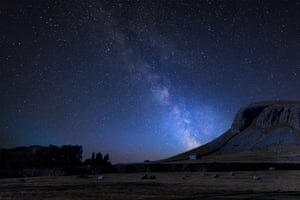
Jim Bailey, chairman of the North York Moors national park authority, said: “This designation as an international dark sky reserve is the culmination of immense dedication and teamwork, and it will continue as we encourage more people to think carefully about our night-time environment. From helping nocturnal wildlife to boosting off-season tourism, the North York Moors looks set to have a better, darker future.”
It is hoped that gaining dark sky reserve status will enable the two national parks to further develop and capitalise on astrotourism. Since 2016 North Yorkshire has held an annual Dark Skies festival across the two national parks each February, which has helped raise the region’s profile as a stargazing destination. Each year the event contributes more than £500,000 to the rural economy, and in 2019 the festival was attended by more than 8,000 people, double the number that participated in 2018.
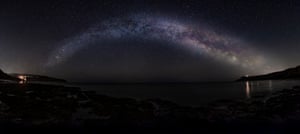
The festival comprises more than 100 events over 17 days, including dine-and-gaze events, after-dark runs and stargazing safaris. This year for the first time, both national parks also hosted fringe events during October half-term.
North Yorkshire’s dark-sky-friendly businesses have welcomed the news. Colin and Vicky Simmons, owners of the Fox and Hounds in Ainthorpe, have been working with the Dark Skies festival for the past 18 months and have taken part in a programme to reduce light pollution in the North York Moors by fitting new lighting around their premises. Vicky said: “Achieving dark sky reserve status is fantastic news. We hope it will bring more international tourists to the area, particularly in the off-season winter months when the night sky is at its best.”
Six ways to experience Yorkshire’s dark skies
Join a stargazing safari in Dalby Forest
The 3,440-hectare Dalby Forest is one of three designated dark sky discovery sites on the North York Moors, all of which have “Milky Way” status – meaning it is possible to glimpse the galaxy with the naked eye here. There are two observatories at Dalby (accessible by arrangement) as well as regular child-friendly stargazing safaris run by Hidden Horizons. In inclement weather, the company puts on a pop-up planetarium for virtual space explorations.
• £15pp, hiddenhorizons.co.uk
Climb Sutton Bank at twilight
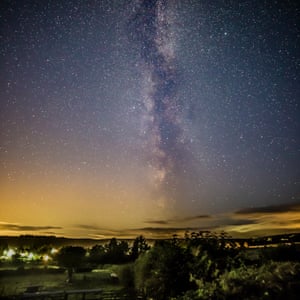
The stark escarpment of Sutton Bank is one of the North York Moors’ best lookout points, and at night it is just as impressive as a balcony on to the stars. It is easily accessible, with a large car park close to the main road between Thirsk and Helmsley, and has well-maintained walking trails suitable for all ages. Arrive at twilight and you’ll quickly be able to step out to areas unpolluted by light, where the horizon opens up.
• northyorkmoors.org.uk
Try astrophotography on the moors
Helmsley-based photographer Steve Bell’s astro workshops offer stargazers the opportunity to freeze the night skies rather than just watch them flicker. Four-hour private tuition is good for a small group (£200; maximum of four participants). In 2021 Bell is also running six North York Moors special weekends (£125pp), covering day and night photography across the moors. The first two courses of the year are already sold out, but his April, August and September dates fall during the months of the year when the Milky Way is typically most visible (between March and April and then August and October).
• stevebellphotography.co.uk
Book a dark-sky inn break
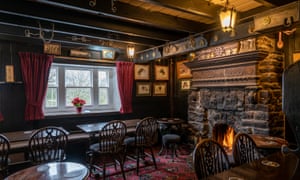
For DIY stargazing, the Yorkshire Dales and North York Moors national parks have both nurtured networks of dark-sky friendly accommodation. One is the 16th-century Fox and Hounds pub in the village of Ainthorpe near Danby. For stargazers, there are night torches, binoculars and sky maps on hand: then they can simply stumble out into the grassy pastures surrounding the inn and look up to the inky canopy.
• From £83 B&B, foxandhoundsainthorpe.com
Dine under the stars in a remote pub pod
At the top of the Yorkshire Dales, down spindly roads you wouldn’t want to drive at night (book a room) lies the Tan Hill Inn – Britain’s most remote and highest pub. On the Pennine Way hiking trail, it’s a former miners’ hostelry and also one of the Yorkshire Dales’ registered dark sky discovery sites. This year, the owners have added transparent dining pods with heating and music, where guests can eat dinner while drinking in the soupy night skies.
• £130 B&B, tanhillinn.com
Lay out a rug on a Dales farm
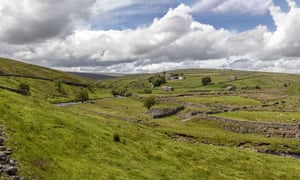
In the sleepy folds of upper Swaledale, Pry House Farm B&B is one of the newest members of the Yorkshire Dales national park’s dark-sky friendly scheme. Stay in either the traditional farmhouse or a shepherd’s hut. After sunset, an all-enveloping darkness grips the surrounding hay meadows and high fells, and the owners provide folding chairs, rugs, flasks of hot drinks, special red-light torches, astronomy guidebooks and binoculars so guests can marvel at it.
• £72 B&B, upperswaledaleholidays.co.uk
The next Dark Skies festival runs across the Yorkshire Dales and North York Moors national parks 12-28 February 2021




